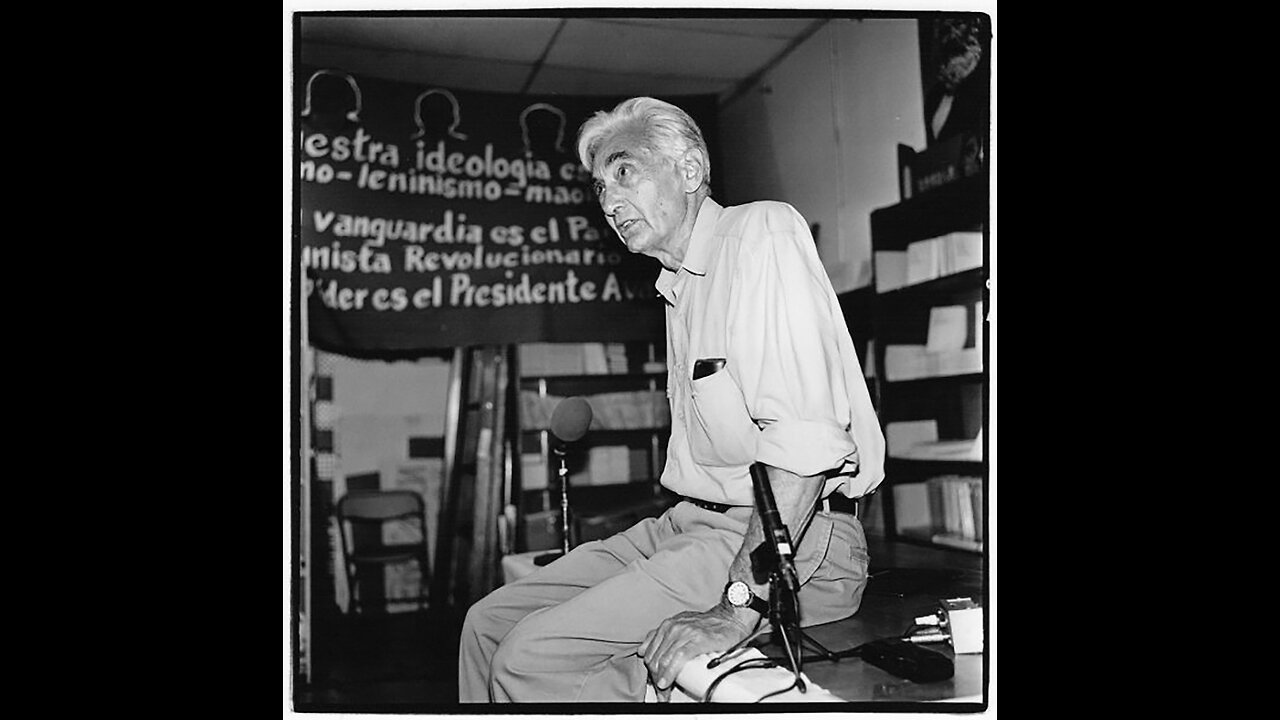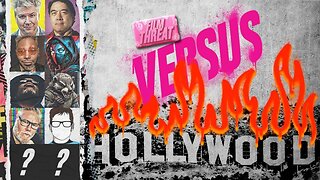Premium Only Content

The Hidden History of the United States: The People Left Out of Textbooks (1999)
When A People's History of the United States was published in 1980, future Columbia University historian Eric Foner reviewed it in The New York Times:
Professor Zinn writes with an enthusiasm rarely encountered in the leaden prose of academic history, and his text is studded with telling quotations from labor leaders, war resisters and fugitive slaves. There are vivid descriptions of events that are usually ignored, such as the Great Railroad Strike of 1877 and the brutal suppression of the Philippine independence movement at the turn of this century. Professor Zinn's chapter on Vietnam—bringing to life once again the free-fire zones, secret bombings, massacres and cover-ups—should be required reading for a new generation of students now facing conscription. Nonetheless, A People's History reflects a deeply pessimistic vision of the American experience ... Uprisings are either crushed, deflected or co-opted ... Why such movements so often fail to achieve their goals is never adequately explained ... The portrayal of these anonymous Americans, moreover, is strangely circumscribed. Blacks, Indians, women, and laborers appear either as rebels or as victims. Less dramatic but more typical lives—people struggling to survive with dignity in difficult circumstances—receive little attention. Nor does Professor Zinn stop to explore the ideologies that inspired the various uprisings he details.
Foner continues by remarking that "history from the bottom up, though necessary as a corrective, is as limited in its own way as history from the top down." What is necessary, Foner asserts, is "an integrated account incorporating Thomas Jefferson and his slaves, Andrew Jackson and the Indians, Woodrow Wilson and the Wobblies, in a continuous historical process, in which each group's experience is shaped in large measure by its relation to others."[26]
Writing in The New York Times, columnist Bob Herbert wrote:
Mr. Zinn was often taken to task for peeling back the rosy veneer of much of American history to reveal sordid realities that had remained hidden for too long.[27]
Herbert quotes from Zinn's account of the presidency of Andrew Jackson as an example of what he means.[27]
Also writing for The New York Times, columnist Michael Powell praised the text's impact on changing the perspective of modern histories:
To describe it as a revisionist account is to risk understatement. A conventional historical account held no allure; he concentrated on what he saw as the genocidal depredations of Christopher Columbus, the blood lust of Theodore Roosevelt and the racial failings of Abraham Lincoln. He also shined an insistent light on the revolutionary struggles of impoverished farmers, feminists, laborers and resisters of slavery and war. Such stories are more often recounted in textbooks today; they were not at the time.[28]
Writing in Dissent, Georgetown University history professor Michael Kazin argued that Zinn is too focused on class conflict, and wrongly attributes sinister motives to the American political elite. He characterized the book as an overly simplistic narrative of elite villains and oppressed people, with no attempt to understand historical actors in the context of the time in which they lived. Kazin wrote:
The ironic effect of such portraits of rulers is to rob 'the people' of cultural richness and variety, characteristics that might gain the respect and not just the sympathy of contemporary readers. For Zinn, ordinary Americans seem to live only to fight the rich and haughty and, inevitably, to be fooled by them.[29]
Kazin argued that A People's History fails to explain why the American political-economic model continues to attract millions of minorities, women, workers, and immigrants, or why the socialist and radical political movements Zinn favors have failed to gain widespread support among the American public.
Sam Wineburg, a professor of history at Stanford University, criticizes Zinn's use of leading questions, cherry-picking of sources and presentation of disputable claims as facts. Wineburg used as an example Zinn's claim that African Americans had "widespread indifference, even hostility" to the American war effort in World War II, which was supported by three quotes. According to Wineburg, Zinn drew the quotes from a book by Lawrence S. Wittner, but omitted evidence from the same pages that African Americans were underrepresented among draft evaders and conscientious objectors. Wineburg argued that the reason for the book's longtime appeal was that it "speaks directly to our inner Holden Caulfield."[30]
Writing in The Chronicle of Higher Education, Christopher Phelps, associate professor of American studies in the School of American and Canadian Studies at the University of Nottingham wrote:
Professional historians have often viewed Zinn's work with exasperation or condescension, and Zinn was no innocent in the dynamic. I stood against the wall for a Zinn talk at the University of Oregon around the time of the 1992 Columbus Quincentenary. Listening to Zinn, one would have thought historians still considered Samuel Eliot Morison's 1955 book on Columbus to be definitive. The crowd lapped it up, but Zinn knew better. He missed a chance to explain how the social movements of the 1960s and 1970s have transformed the writing and teaching of history, how his People's History did not spring out of thin air but was an effort to synthesize a widely shared shift in historical sensibilities. Zinn's historical theorizing, conflating objectivity with neutrality and position with bias, was no better. The critics would be churlish, however, not to acknowledge the moving example Zinn set in the civil-rights and Vietnam movements, and they would be remiss not to note the value of A People's History, along with its limitations. Zinn told tales well, stories that, while familiar to historians, often remained unknown to wider publics. He challenged national pieties and encouraged critical reflection about received wisdom. He understood that America's various radicalisms, far from being "un-American," have propelled the nation toward more humane and democratic arrangements. And he sold two-million copies of a work of history in a culture that is increasingly unwilling to read and, consequently, unable to imagine its past very well.[31]
In The New York Times Book Review in a review of A Young People's History Of The United States, volumes 1 and 2, novelist Walter Kirn wrote:
That America is not a better place—that it finds itself almost globally despised, mired in war, self-doubt and random violence—is also a fact, of course, but not one that Zinn's brand of history seems equal to. His stick-figure pageant of capitalist cupidity can account, in its fashion, for terrorism—as when, in the second volume, subtitled "Class Struggle to the War on Terror," he notes that Sept. 11 was an assault on "symbols of American wealth and power"—but it doesn't address the themes of religious zealotry, technological change and cultural confusion that animate what I was taught in high school to label "current events" but that contemporary students may as well just call "the weirdness." The line from Columbus to Columbine, from the first Independence Day to the Internet, and from the Boston Tea Party to Baghdad is a wandering line, not a party line. As for the "new possibilities" it points to, I can't see them clearly.[7]
Professors Michael Kazin, Michael Kammen and Mary Grabar condemn the book as a black-and-white story of elite villains and oppressed victims, a story that robs American history of its depth and intricacy and leaves nothing but an empty text simplified to the level of propaganda.[29][32][33]
Other editions and related works
A version of the book titled The Twentieth Century contains only chapters 12–25 ("The Empire and the People" to "The 2000 Election and the 'War on Terrorism'"). Although it was originally meant to be an expansion of the original book, recent editions of A People's History now contain all of the later chapters from it.
In 2004, Zinn and Anthony Arnove published a collection of more than 200 primary source documents titled Voices of a People's History of the United States, available both as a book and as a CD of dramatic readings. Writer Aaron Sarver notes that although Kazin "savaged" Zinn's A People's History of the United States, "one of the few concessions Kazin made was his approval of Zinn punctuating 'his narrative with hundreds of quotes from slaves and Populists, anonymous wage-earners and ... articulate radicals'".[34]
Sarver argued that, whether Zinn intended it or not, Voices served as a useful response to Kazin's critique. "Voices is a vast anthology that tells heartbreaking and uplifting stories of American history. Kazin will be hard-pressed to charge Zinn with politicizing the intelligence here; the volume offers only Zinn's sparse introductions to each piece, letting the actors and their words speak for themselves."[34]
In 2008, Zinn worked with Mike Konopacki and Paul Buhle on creating A People's History of American Empire, a graphic novel that covers various historic subjects drawn from A People's History of the United States as well as Zinn's own history of his involvement in activism and historic events as covered in his autobiography You Can't Be Neutral on a Moving Train.
Zinn worked as the editor for a series of books under the A People's History label. This series expands upon the issues and historic events covered in A People's History of the United States by giving them in-depth coverage, and also covers the history of parts of the world outside the United States. These books include:[citation needed]
A People's History of the Supreme Court by Peter Irons with foreword by Zinn [35]
A People's History of Sports in the United States by Dave Zirin with an introduction by Howard Zinn
A People's History of American Empire by Howard Zinn, Mike Konopacki, and Paul Buhle
The Darker Nations: A People's History of the Third World by Vijay Prashad
A People's History of the American Revolution by Ray Raphael
A People's History of the Civil War by David Williams
A People's History of the Vietnam War by Jonathan Neale
The Mexican Revolution: A People's History by Adolfo Gilly
Likewise, other books were inspired by the series:
A People's History of Australia from 1788 to the Present edited by Verity Burgmann. A four-volume series that looks at Australian history thematically, not chronologically.
A People's History of Science: Miners, Midwives, and Low Mechanicks by Clifford D Connor.
A People's History of the World by Chris Harman. It is endorsed by Zinn.
A People's History of Christianity by Diana Butler Bass.
The Assassination of Julius Caesar: A People's History of Ancient Rome by Michael Parenti. It is endorsed by Zinn.
A People's History of Modern Europe by William A. Pelz
Ludowa historia Polski (A People's History of Poland) by Adam Leszczyński (2020)[36]
An Indigenous Peoples' History of the United States by Roxanne Dunbar-Ortiz. The third of a series of five books which reconstruct U.S. history from marginalized peoples' perspectives.[37]
Younger readers' version
In July 2007 Seven Stories Press released A Young People's History of the United States, an illustrated, two-volume adaptation of A People's History for young adult readers (ages 10–14). The new version, adapted from the original text by Rebecca Stefoff, is updated through the end of 2006, and includes a new introduction and afterword by Zinn.
In his introduction, Zinn writes, "It seems to me it is wrong to treat young readers as if they are not mature enough to look at their nation's policies honestly. I am not worried about disillusioning young people by pointing to the flaws in the traditional heroes." In the afterword, "Rise like lions", he asks young readers to "Imagine the American people united for the first time in a movement for fundamental change."
In addition, the New Press released an updated (2007) version of The Wall Charts for A People's History—a 2-piece fold-out poster featuring an illustrated timeline of U.S. history, with an explanatory booklet.
Lessons for the classroom
In 2008, the Zinn Education Project was launched to promote and support the use of A People's History of the United States (and other materials) for teaching in middle and high school classrooms across the U.S. The goal of the project is to give American students Zinn's version of U.S. history.[38] With funds from an anonymous donor who had been a student of Zinn's, the project began by distributing 4,000 packets to teachers in all states and territories. The project now offers teaching guides and bibliographies that can be freely downloaded.[39]
Current editions
Zinn, Howard (2005). A People's History of the United States: 1492–present. Harper Perennial Modern Classics. ISBN 0-06-083865-5.
Zinn, Howard (2003). A People's History of the United States: 1492–present (3rd ed.). HarperCollins. ISBN 0-06-052842-7.
Zinn, Howard (1999). A People's History of the United States: 1492–present. HarperCollins. ISBN 0-06-019448-0.
Zinn, Howard (1995). A People's History of the United States: 1492–present (2nd ed.). HarperCollins. ISBN 0-06-092643-0.
Zinn, Howard (1980). A People's History of the United States (1st ed.). Harper & Row. ISBN 0-06-014803-9.
Zinn, Howard (2003). The Twentieth Century. Harper Perennial. ISBN 0-06-053034-0
Zinn, Howard (2005). Arnove, Anthony (ed.). Voices of a People's History of the United States. Seven Stories Press. ISBN 1-58322-628-1.
A Young People's History of the United States, adapted from the original text by Rebecca Stefoff; illustrated, in two volumes; Seven Stories Press, New York, 2007
Vol. 1: Columbus to the Spanish–American War. ISBN 978-1-58322-759-6
Vol. 2: Class Struggle to the War on Terror. ISBN 978-1-58322-760-2
Teaching Editions
A People's History of the United States: Teaching Edition
A People's History of the United States, Abridged Teaching Edition, Updated Edition
A People's History of the United States: Volume 1: American Beginnings to Reconstruction, Teaching Edition
A People's History of the United States, Vol. 2: The Civil War to the Present, Teaching Edition
A People's History of the United States: The Wall Charts; designed by Howard Zinn and George Kirschner; New Press (2007). ISBN 978-1-56584-171-0
See also
Lies My Teacher Told Me a 1995 book by sociologist James Loewen
Open Veins of Latin America, a critical history of Latin America by Eduardo Galeano
The People Speak (film), the 2009 film produced and narrated by Howard Zinn and inspired by A People's History of the United States and Voices of a People's History of the United States
A Patriot's History of the United States: From Columbus's Great Discovery to the War on Terror, written as a conservative response to A People's History of the United States
The Untold History of the United States, a 2012 documentary series directed, produced, and narrated by Oliver Stone
Page Smith wrote an eight-volume history with the same title, whose first volume appeared in 1976, four years before Zinn's book was published
We, the People the Drama of America, a Marxist history of the United States by Leo Huberman (1932)
People's history
Explanatory notes
References
Howard Powell (January 27, 2010). "Howard Zinn, Historian, Dies at 87". The New York Times. "Mr. Zinn, delighted in ... lancing what he considered platitudes, not the least that American history was a heroic march toward democracy ... 'Our nation had gone through an awful lot—the Vietnam War, civil rights, Watergate—yet the textbooks offered the same fundamental nationalist glorification of country,' Mr. Zinn recalled in an interview with The New York Times. 'I got the sense that people were hungry for a different, more honest take.'"
Adele Ferguson (October 5, 2005). "Controversy brews over school textbook". The Arlington Times. p. A7.
Prix des Amis du Monde diplomatique 2003 announcement, December 1, 2003.
Parayre, Catherine (February 18, 1998). "The Conscience of the Past: An interview with historian Howard Zinn". Flagpole Magazine. Archived from the original on May 25, 2001. Retrieved February 15, 2006.
Chris Beneke and Randall Stephens, "Lies the Debunkers Told Me: How Bad History Books Win Us Over", The Atlantic, 24 July 2012. Retrieved 18 September 2020.
Handlin, Oscar (Autumn 1980). "Arawaks". The American Scholar. 49 (4): 546–550. JSTOR 41210677.
Kirn, Walter (June 17, 2007). "Children's Books". The New York Times.
Markowitz, Norman. "In Defense of the Late, Great Howard Zinn". History News Network. Retrieved April 23, 2021.
Masciotra, David (July 25, 2018). "In Defence of Howard Zinn". The American Conservative. Retrieved April 23, 2021.
Patrick McCarthy, Timothy (July 13, 2017). "Howard Zinn at 90: Defending the People's Historian". The Daily Beast. Retrieved April 23, 2021.
"Mark Twain". October 10, 2006. Archived from the original on October 10, 2006.
"Comments on the Moro Massacre by Mark Twain (March 12, 1906)". Department of Interdisciplinary Studies, College of Urban, Labor and Metropolitan Affairs (CULMA), Wayne State University. Archived from the original on December 28, 2005.
Howard Zinn (July 1, 2007). "Making History". The New York Times. Retrieved November 14, 2010.
Zinn, Howard. "A People's History of the United States". New York: Perennial Classics, 2003. p. 47 ISBN 0-06-052837-0
Zinn, Howard. A People's History of the United States. New York: Perennial Classics, 2003. p. 98 ISBN 0-06-052837-0
A Radical Treasure by Bob Herbet, The New York Times, January 29, 2010
Zinn, Howard (2003). "Chapter 8: We take nothing by conquest, Thank God". A People's History of the United States. New York: HarperCollins Publishers.
"The great railroad strike, 1877 – Howard Zinn".
Zinn, Howard. A People's History of the United States. New York: HarperCollins, 1999. pp. 245–251 ISBN 0-06-052837-0
Zinn, Howard. A People's History of the United States. New York: HarperCollins, 1995. p. 383 ISBN 0-06-092643-0
Zinn, Howard. A People's History of the United States. New York: HarperCollins, 1995. p. 384 ISBN 0-06-092643-0
Zinn, p. 407
Zinn, p. 416
Zinn, pp. 639–640
Zinn, p. 681
Foner, Eric, "Majority Report", New York Times Book Review, March 2, 1980, pp. BR3–BR4.
Herbert, Bob (January 30, 2010). "A Radical Treasure". The New York Times. Retrieved November 21, 2018.
"Howard Zinn, Historian, Dies at 87" by Howard Powell in The New York Times January 30, 2010
"Howard Zinn's History Lessons", by Michael Kazin, Dissent, Spring 2004
Wineburg, Sam (Winter 2012–13). "Undue Certainty: Where Howard Zinn's A People's History Falls Short". American Educator: 27–34.
Phelps, Christopher (February 1, 2010). "Howard Zinn, Philosopher" – via The Chronicle of Higher Education.
Kammen, Michael (March 23, 1980). "How the Other Half Lived". Washington Post Book World. p. 7. Retrieved August 10, 2011.
Grabar, Mary (2020). Debunking Howard Zinn: Exposing the Fake History That Turned a Generation against America. Regnery. p. 352. ISBN 978-1621577737.
Aaron Sarver, The Secret History", In These Times, 16 September 2005
"Tables of Contents for A People's History of the Supreme Court".
"Ludowa historia Polski [A People's History of Poland]". Polish History. February 25, 2021. Retrieved April 26, 2021.
"Books". ReVisioning History. July 20, 2015. Retrieved August 13, 2021.
Mulcahy, Cara M. (2010). Marginalized Literacies: Critical Literacy in the Language Arts Classroom. IAP. pp. 125–126. ISBN 978-1-60752-454-0.
The Social Studies Professional (204–208). National Council for the Social Studies: 19–22. 2008.
-
 31:00
31:00
The Memory Hole
1 month agoThe Perils of a Life of Dirty Tricks in the CIA (1978)
994 -
 LIVE
LIVE
Revenge of the Cis
2 hours agoEpisode 1429: Catch And Release
602 watching -
 UPCOMING
UPCOMING
Film Threat
6 hours agoVERSUS: HOLLYWOOD IS STILL ON FIRE | Film Threat Versus
299 -
 LIVE
LIVE
Silver Dragons
1 hour agoSilver Price Crushed Today - NEW TREND STARTING?
76 watching -
 LIVE
LIVE
In The Litter Box w/ Jewels & Catturd
19 hours agoRecall Newscum & Bass! | In the Litter Box w/ Jewels & Catturd – Ep. 718 – 1/13/2025
5,684 watching -
 3:19:58
3:19:58
Tate Speech by Andrew Tate
7 hours agoEMERGENCY MEETING EPISODE 101 - STRENGTH AND HONOR
90.9K41 -
 1:48:09
1:48:09
The Quartering
4 hours agoLA Fires Are About To Get Way Worse, Trump Vs Vance On J6 Pardons, Brett Cooper Bombshell & More
66.2K26 -
 LIVE
LIVE
Dr Disrespect
4 hours ago🔴LIVE - DR DISRESPECT - MARVEL RIVALS - TOP 500 IN THE WORLD
3,604 watching -
 1:05:49
1:05:49
MTNTOUGH Fitness Lab
6 hours agoDamon West: How Faith and Mental Toughness Helped Me Escape Prison | MTNPOD #99
771 -
 1:43:05
1:43:05
The Criminal Connection Podcast
6 hours agoIAN MCCRANOR: World Champion Karate Doorman CRAZY Life Story, Mob Hits GONE WRONG & Video Game Star!
5561